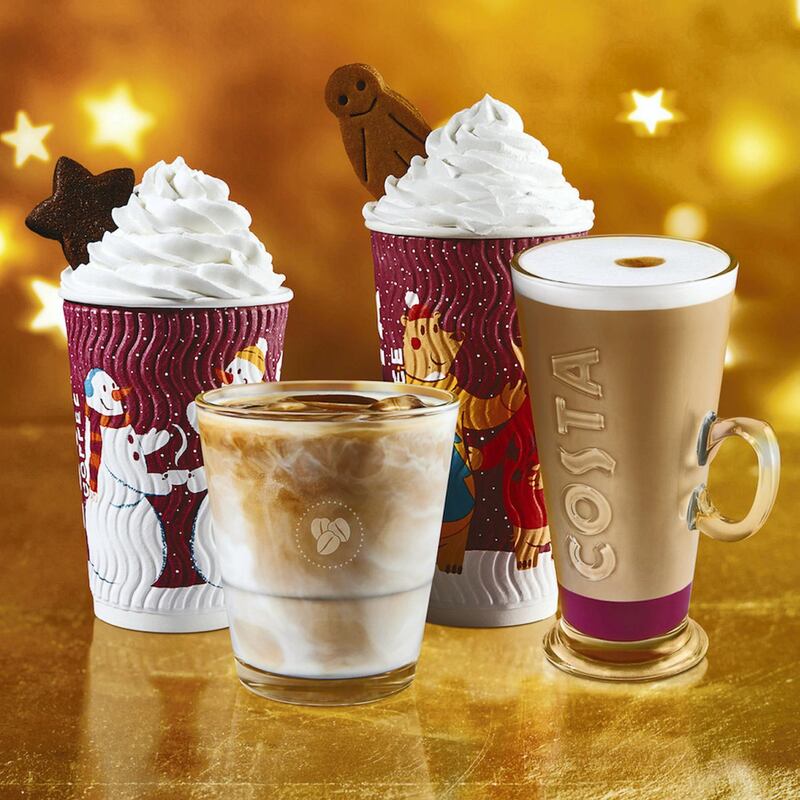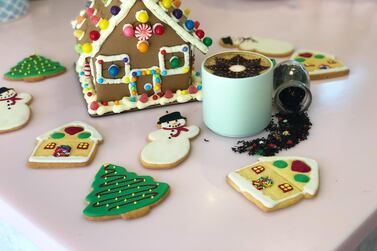When you treat yourself to a festive coffee from a cafe this Christmas you could unwittingly be consuming as much sugar as is contained in four white-chocolate and strawberry muffins, a study found.
Action on Sugar, a campaign group in the UK, tested some of the popular seasonal offerings at coffee chains and found some eyebrow-raising results.
The worst offender, Starbucks’s Signature Caramel Hot Chocolate with whipped cream, made with oat milk, contains more than 23 teaspoons of sugar and 758 calories.
Plenty of festive drinks are on sale in the UAE, including Toffee Nut Lattes at Starbucks, Cookies and Cream Hot Chocolate at Costa Coffee and Salted Caramel Hot Chocolate at Caffe Nero — another drink singled out in the survey.
According to Action on Sugar, a grande Salted Caramel Hot Chocolate made with skimmed milk contains almost 15 teaspoons of sugar (59.6g) and has 503 calories. The group said an average person would have to exercise for 90 minutes on the cross trainer to burn that energy off.
Holly Gabriel, a registered nutritionist at Action on Sugar, said it was "shocking" that so many coffee chains could be putting customers' health at risk.
“Coffee shops and cafes need to take much greater steps to reduce the levels of sugar and portion sizes, promote lower-sugar alternatives and stop pushing indulgent extras at the till,” she said.
Although the body requires some sugar to function normally, anything over the limit can result in weight gain and can cause insulin resistance, which can lead to type 2 diabetes and inflammation, said Alaa Takidin, a clinical dietitian at a hospital in Dubai.
"Sugar can, in a sense, show addictive properties as well. Once we start consuming higher quantities of sugar the body ends up craving for more and ends up in a repetitive cycle," she said.
Lauren Jacobsen, director of nutrition for Kcal World, said while we now know a lot more about what sugar does to our bodies, we do not always follow good advice.
"Maybe we ignore it at Christmas or other festive times because we want to have that sweet treat," she said.
Having a sugary drink very occasionally is OK, but it is much better to make healthy choices all of the time.
“Always ask when you have a drink like this what the ingredients are, so you become more aware of what you are drinking or eating. The same goes for when you are going grocery shopping or buying something off the shelf," Ms Jacobsen said.
"Get into the habit of reading what’s in the product. Sugar is not going to give you much benefit. We want to have complex carbs and carbs that are higher in fibre which gives us more energy. Sugar will be very short lived.”
Preparing drinks at home is a good way to control your sugar intake, said Ms Takidin.
Freshly squeezed juices with no added sugar are a healthier alternative to sugary drinks.
She suggested drinking home-made tea, iced tea, smoothies and sparkling water, which can be flavoured with lemon, lime or other fruit infusions.
"If you're an avid coffee drinker then you can try to add cinnamon or nutmeg or substitute milk alternatives such as soy, almond or hazelnut but do remember to read the label as they may have added sugar," said Ms Takidin.
A spokeswoman for Starbucks told British media that customers could opt for a smaller size drink and customise their beverage by asking for reduced fat milk and less or no cream.
"We are committed to reducing sugar in all our beverages and since 2015 we've delivered a 9 per cent reduction in the sugar content of our gingerbread and core syrup range of vanilla, caramel and hazelnut," the spokeswoman said.
This year, concerns were raised about a new Starbucks cheesecake drink, which a UAE medic claimed was a “fire ball of fat and sugar”.
A regular-size version of the drink contains 452 calories and 19.4 grams of fat, 13.7g of which is saturated fat — equivalent to almost two McDonald's hamburgers, which have 250 calories each.







